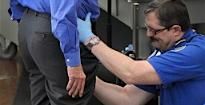Airports Look at Ditching TSA
Every spring, private security officers at San Francisco International Airport compete in a workplace "March Madness"-style tournament for cash prizes, some as high as $1,500.
The games: finding illegal items and explosives in carry-on bags; successfully picking locks on difficult-to-open luggage; and spotting a would-be terrorist (in this case Covenant Aviation Security's president, Gerald L. Berry) on security videos.
"The bonuses are pretty handsome," Berry said. "We have to be good - equal or better than the feds. So we work at it, and we incentivize."
Some of the nation's biggest airports are responding to recent public outrage over security screening by weighing whether they should hire private firms such as Covenant to replace the Transportation Security Administration. Sixteen airports, including San Francisco and Kansas City International Airport, have made the switch since 2002. One Orlando airport has approved the change but needs to select a contractor, and several others are seriously considering it.
The Metropolitan Washington Airports Authority, which governs Dulles International and Reagan National airports, is studying the option, spokeswoman Tara Hamilton said.
For airports, the change isn't about money. At issue, airport managers and security experts say, is the unwieldy size and bureaucracy of the federal aviation security system. Private firms may be able to do the job more efficiently and with a personal touch, they argue.
Airports that choose private screeners must submit the request to the TSA. There are no specific criteria for approval, but federal officials can decide whether to grant the request "based on the airport's record of compliance on security regulations and requirements." The TSA pays for the cost of the screening and has the final say on which company gets the contract.
Rep. John L. Mica (R-Fla.), the incoming chairman of the House Transportation and Infrastructure Committee, has written to 200 of the nation's largest airports, urging them to consider switching to private companies.
The TSA was "never intended to be an army of 67,000 employees," he said.
"If you look at [the TSA's] performance, have they ever stopped a terrorist? Anyone can get through," Mica said in an interview. "We've been very lucky, very fortunate. TSA should focus on its mission: setting up the protocol, adapting to the changing threats and gathering intelligence."
Click here to read more.


